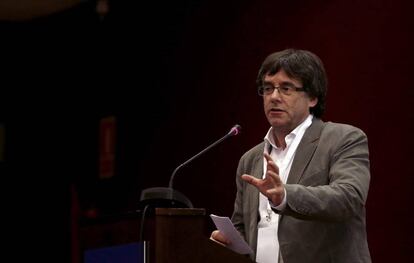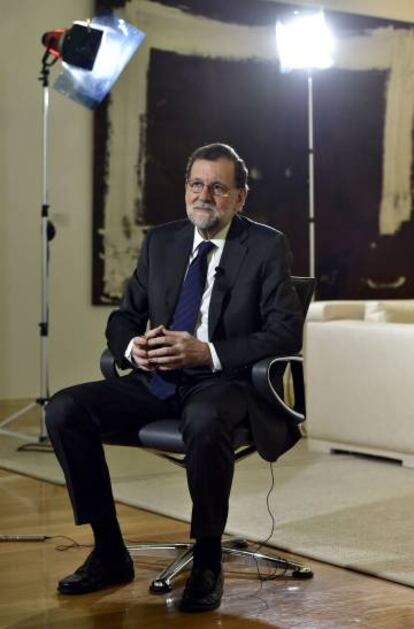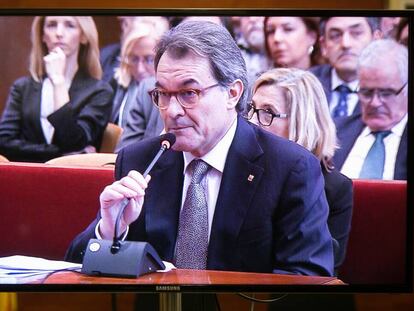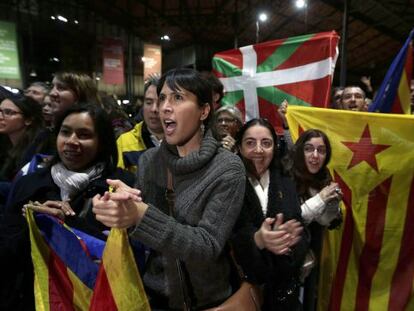Catalonia wary about Madrid’s offer to talk, but willing to sit down
Regional leader warns he will not give up on plans for a binding referendum even if talks get underway
The Catalan government on Sunday said it is ready to negotiate with central authorities in Spain in order to take the political situation in the northeastern region in a new direction. But Catalan officials are waiting to see what kind of proposals come out of the conservative administration of Mariano Rajoy, of the Popular Party (PP), who has repeatedly said in the past that full sovereignty for Catalonia is not an option.

Regional premier Carles Puigdemont has expressed skepticism at Madrid’s plans for talks, but nevertheless asserted that he “would like” to sit down to discuss the future of a region where separatism has taken on new force ever since Spain fell victim to a major economic crisis.
Puigdemont has denied involvement in any type of negotiation with Madrid so far, either in a “private or official” capacity. But he expressed a willingness to do so in future: “Believe me, we would like that.” He also joked about the alleged offer from Rajoy, which he likened to “the Holy Ghost: everybody talks about it, but nobody has seen it.”
To think that we are going to give up on the referendum is to understand nothing
Anonymous pro-independence leader
During their one and only official meeting, on April 20, 2016, Puigdemont handed Rajoy a list of 46 demands for Catalonia. Rajoy now wants to reply to 45 of these points, which cover issues ranging from tax policy to social relief and power sharing. The 46th point, however, is the one demanding a binding referendum on independence for the region, and that is a non-negotiable issue for Madrid.
Puigdemont’s deputy, Neus Munté, added that she hoped the conversations will be clear and frank. However, both officials underscored that they are not giving up on a referendum on self-rule that is planned for later this year. Their Democratic Party of Catalonia (PDECat), formerly known as Convergència, has made a public pledge to hold the vote regardless of opposition from Madrid.
The 9N vote
An earlier, informal vote held on November 9, 2014 yielded a majority support for independence but was widely rejected as biased. This vote also landed the former Catalan premier Artur Mas and two top aides in court, accused of disobeying orders from the Constitutional Court to refrain from holding the ballot.

This trial and other cases initiated by the government are being viewed by separatists as a direct attack against them, and as evidence of Madrid’s unwillingness to deal with Catalan demands without resorting to the courts.
The Mas trial also illustrates how relations between Madrid and Barcelona soured throughout Rajoy’s first term in office. Now, from a much weaker position in Congress, where he leads a minority government, the PP appears willing to come up with a political proposal for Catalonia.
The government’s delegate in the region, Enric Millo, said there have been contacts “at all levels” between the executives of Rajoy and Puigdemont, and noted that these encounters are not always made public.
“We are very keen to find a way out,” said Millo in an interview on the Catalan station TV3, where he underscored the need to “design between all of us an alternative path to the collision course represented by the call for a referendum.”
“There are many things that can be done without changing the Constitution,” he added.
Too little, too late
On Thursday of last week, former premier Artur Mas, under whose tenure the informal ballot of 2014 was held, brought back the old idea of “a third way” out of the Catalan conundrum. But many proponents of independence feel that whatever Madrid offers now, it will be too little, too late. Although a negotiated way out would have presumably been easier under Mas, the new regional government now includes the hardcore separatists of the Catalan Republican Left (ERC), while the old Convergència has morphed into PDECat in an effort to clean its image of corruption, and has embraced separatism much more whole-heartedly than ever before.
And last September, Puigdemont secured the backing of the regional assembly for his project to hold a binding referendum within a year. This promise gained him the support of the radical anticapitalist CUP party, which keeps reminding Puigdemont about his pledge on a daily basis.
All of which makes it unlikely that Puigdemont is either willing or able to backtrack on the referendum. “To think that we are going to give up on that is to understand nothing,” said one pro-independence leader in the region.
English version by Susana Urra.









































